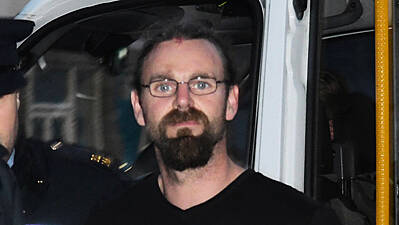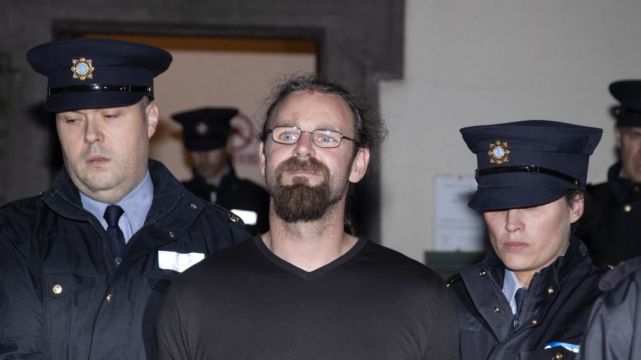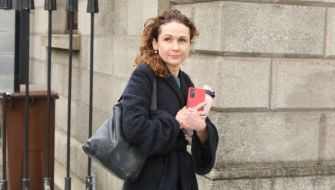Stephen Silver, who is charged with murdering Garda Colm Horkan by shooting the garda dead with his own gun, is “an unreliable historian” concerning his mental health difficulties, a consultant psychiatrist has told the Central Criminal Court.
“One can’t be confident of what he says,” Professor Harry Kennedy told the jury in the trial of Mr Silver (46), of Aughavard, Foxford, Co Mayo, saying that he found “no positive evidence” that Mr Silver had suffered a relapse of bipolar affective disorder at the time he shot dead Gda Horkan.
Mr Silver has pleaded not guilty to the murder of Gda Horkan knowing or being reckless as to whether he was a member of An Garda Síochána acting in accordance with his duty at Castlerea, Co Roscommon on June 17th, 2020.
He has pleaded guilty to manslaughter and the jury have been told the main issue in the trial is Mr Silver’s state of mind at the time of the shooting.
Cross-examining Prof Kennedy on Wednesday defence counsel Dominic McGinn SC put it to the witness that in his medical report he made a reference to Mr Silver appearing to be having hallucinations or delusions.
Prof Kennedy confirmed that Mr Silver exhibited signs of “abnormal belief”.
He said that on one occasion Mr Silver stood at the door of his cell all night as he thought that was what “they wanted me to do,” and Mr Silver also thought that if he breathed in a certain way, he would grow muscles.
Deluded
Prof Kennedy said that when Mr Silver was taken to Castlerea Prison, he thought he was “in a special room where he would metamorphose into something else”.
Prof Kennedy confirmed to Mr McGinn that he thought Mr Silver was deluded and clearly unwell.
He said he accepted it was possible that Mr Silver was in the early stages of a relapse of his mental disorder, but he described Mr Silver as “an unreliable historian”.
“One can’t be confident of what he says,” said Prof Kennedy.
“In your report following his arrest, you noted his appearance manifested an abnormal mental state, and he may have been at the early stage of such an episode. You considered that he may well have been in the early stage of relapse at the time of the offence,” said Mr McGinn.
“Even if that were the case, that would not change my opinion concerning the issue of insanity and diminished responsibility,” replied the witness.
He went on to say that he found “no positive evidence” that Mr Silver had suffered a relapse at the time of the offence.
He said that Mr Silver was admitted to hospital due to a number of incidents and the stress of the process following his arrest.
Prof Kennedy said that Mr Silver was shown one of the videos of evidence in the case, and he became angered by it and spent the rest of the day reacting to that.
Normal reaction
“That reaction wouldn’t be a normal reaction by a right-thinking person,” suggested Mr McGinn.
“Normality is so broad and encompasses such a range of behaviours that it is impossible to put a limit on what is normal,” said Prof Kennedy.
“You could be wrong and what he was exhibiting on June 23rd was a relapse?” asked Mr McGinn.
“Anyone could be wrong, but you have to be very careful and consider what could be the different causes,” said Prof Kennedy.
Mr McGinn referred to a preadmission report prepared by psychiatric staff in prison before Mr Silver was brought to the Central Mental Hospital, which included a working diagnosis that Mr Silver was suffering from schizoaffective or bipolar affective disorder and was assessed as unfit.
Prof Kennedy replied that it was “quite inappropriate” for such an assessment to be in the report.
“That may have been a nurse, and they would not have had access to the book of evidence,” he said.
"Whoever filled it in said 'not guilty by reason of insanity',” said Mr McGinn.
“That should not be there. That document is dated June 23rd. It’s a very hasty document and far too premature to attach weight to,” replied Prof Kennedy.
Mr McGinn said that by the time Mr Silver arrived at the hospital it was decided appropriate to admit him and order him to be secluded for two weeks.
He said that in the report, Prof Kennedy had certified that at that point in time Mr Silver suffered from a mental disorder and he should be kept in seclusion.
Prof Kennedy confirmed this.
Mr McGinn asked him why he had left this part of the process out of the evidence he had previously given.
"I can only answer the questions put to me,” said Prof Kennedy.
Mr McGinn referred to a multidisciplinary case conference report that assessed Mr Silver’s progress in the hospital.
Risk of harm
In the report, it was noted that Mr Silver had been put into seclusion on the day he was admitted due to a risk of harm to himself and others.
He did not sleep that night and was restless, exhibiting abnormal behaviour such as undressing and dressing, kneeling in different parts of the room, and responding to different stimuli.
Prof Kennedy confirmed that this was evidence of mental illness.

Mr McGinn said that when Mr Silver arrived at hospital, he was restless and pacing, but then the following morning he was polite and cooperative. He said this was not markedly different from his time in the garda station.
Prof Kennedy agreed with this assertion.
In her evidence for the defence, Dr Brenda Wright, interim clinical director at the Central Mental Hospital, said it was her view that Mr Silver’s illness at the time of the killing of Gda Horkan was such that it impaired his thinking and his judgement and therefore contributed significantly to his actions at that time.
The trial continues on Thursday before Ms Justice Tara Burns and the jury of seven men and five women.







